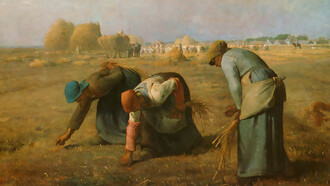The sowing is life, and as such, it is born, grows, nourishes us, feeds on us, and, when it's about to die, it reinvents itself and reemerges, adapting to our needs. The Valencian sowing lives. It is a social microsystem that reminds us of and confirms that the advertising slogan "Welcome to the independent republic of your home..." isn't necessarily true. Our home is often not ours; it's a tyrannical neighborhood, and we are not always welcome, although our home is always, and very much ours, wherever it is.
The Huerta de Valencia (Valencian sowing) is a historic agricultural region. La Vega is part of this Valencian Huerta, with its own culture and customs. Its products are the essence of the rich, healthy, and varied Valencian cuisine. In the 19th century, if Valencians worked the land from sunrise to sunset, the profits always went to the landowners, who, from the city of Valencia, rented the land to peasant families at usurious prices and under abusive conditions. The barraca (the cabin, hut, or shack) is the typical dwelling of these families of pages, which accompanies the rent of those lands, to be exploited by the oppressed who live off the pagesia way of life in Valencia. In the end, who exploits whom?
The Valencian Huerta represents the contrast between the beauty of the rural Mediterranean landscape and the social injustice of these human relationships between diminished masters and servants, so tranquil and peaceful, like a ticking time bomb or a clock that doesn't appreciate the passage of time. At any moment, it explodes in an unexpected direction.
Vicente Blasco Ibáñez (1867-1928) described how human relations worked in the Huerta de Valencia in the 19th century in many of his novels; however, in none of them did he illustrate its cruelty and rawness as in La Barraca of 1898.
Blasco Ibáñez is considered the first Spanish writer to achieve international bestseller success after Miguel de Cervantes. The American press paid him up to $1,000 per article at the time. Of the 55 novels he published, The Four Horsemen of the Apocalypse was the most popular, with over 200,000 copies sold in the United States alone in 1919. It was the best-selling book in that country and year. Its success in bookstore windows secured him a place in Hollywood, and it was adapted for the big screen in 1921 and 1962. Other works of his have appeared in film, including Blood and Sand in 1922, 1948, and 1989, also in Hollywood, and Cañas y Barro and La Barraca in Spain, for film and television, among others.
As a young man, he was an anarchist and a prisoner for it. He was a Republican Congressman, wealthy, outspoken, and anti-communist. He criticized the Catholic Church and the monarchy of his time for corruption scandals in which both institutions were implicated. He died in France, and his remains were repatriated to Valencia after the Republic was restored years later, as he had requested in his will. He was welcomed on the shoulders of a moved crowd who never forgot that several of his novels had literary portrayed what Joaquín Sorolla had depicted of the Valencian Mediterranean.
The last of these Valencian costumbrista novels that portrayed the sowing field was La Barraca. It is a harsh story that describes the effects of disproportionate and negative leadership. It is the story of Toni Pimentó, attractive, addicted to everything one can be addicted to in this world, admired or feared by men and desired or tolerated by the women of the Huerta. His wife, Pepeta, sickly and tireless, endures him loyally. He is the typical braggart and boaster, a man to be reckoned with.
The plot begins with the tragic story of Uncle Barret and his family. He is a hardworking man on his master's land, and he is proud that his family has farmed it like no one else for over 100 years and five generations of Barrets, living in the shack with his daughters and wife. Uncle Barret is elderly and has had to go further into debt with his master and take out another usurious loan to replace his horse.
Furthermore, his master has raised the rent even further, and the task has become materially impossible. The Barret family loses everything after their master repeatedly refuses to reconsider the situation, despite a family history of contentment, contentment, and contentment. In a fit of rage, Uncle Barret kills his master, Don Salvador, the owner of the land. Uncle Barret dies in prison without remedy, and with the sentence, his wife and daughters are expelled from the barracks and take to the streets to beg, steal, and prostitute themselves.
The entire town knows the truth and has sworn that no one will work the land, now owned by Don Salvador's children, to honor the memory of Uncle Barret and his family. However, as we've already said, the sowing field reinvents itself when it's about to die, and over time, Batiste Borrull and his family appear. They will work the land owned by Don Salvador's children, thanks to an advantageous two-year unpaid rent, until it becomes productive again, and they will live in the shack if it is repaired. Batiste, his wife Teresa, their tall and beautiful daughter Roseta, and four other children represent the spirit of the immigrant who, although from neighboring villages, is unknown in the Huerta, especially to its inhabitants. They remind us that the emigrant does so out of necessity, seeking a new opportunity or simply to forge a better future, especially for the benefit of their loved ones.
The immigrant has courage. Most of the time, they leave what they know out of necessity, and other times, although they feel comfortable in their place of origin, with a restless spirit, they want to improve themselves. The spirit of someone who is always looking for something more, something better. The immigrant usually undertakes two things: first, emigrating upon departure, and second, starting over upon arrival and settling. The immigrant is usually driven by an inner strength that doesn't stop them. Emigration has always existed and always will. There will always be a place where there are people in need, where they feel they cannot progress, and where they have the hope of finding their home in the neighboring city, country, or continent.
Batiste and his family have a commitment and want to keep it. Together, they're renovating La Barraca to make it more beautiful, the sowing is productive again, the children are attending classes at the local school, and Roseta is the best worker in one of the new industries in the area.
But they soon felt the whiplash of neighborly indifference. No one in the area spoke to them. Batista's children, who attended school, were ostracized by their coworkers. The other workers at the industrial plant and the residents of Roseta, who walked each morning and returned from work, didn't speak to her and let her walk alone and apart. Only one young man dared to wait for her wherever she went, to accompany her in silence: Tonet, a neighbor who fell madly in love with her. Tonet was ostracized by everyone's mockery, his personality, and his extreme shyness. He was the grandson of Uncle Tomba, the local shepherd, a blind old man who had warned Batista of the curse on the land he would be working. For his audacity, Tonet was fired as a butcher's assistant and ostracized by the rest of the population.
One bad day, Batiste is charged before the Valencia Water Court. Pimentó lies about the newcomer's alleged failure to comply with the irrigation program. Despite Batiste's explanations, the people from the Huerta support Pimentó. Batiste is unjustly sentenced by one of the oldest courts in the world, still in operation. Justice is not always found in the courts. Batiste and his family steadfastly disobey the sentence. Pimentó and the Huerta’s neighbors do not accuse him again. They will resolve the case in their own way.
Pimentó continues to pressure the neighbors to reject the newcomers. He even dares to directly threaten Batiste, and one of his nieces hits Roseta, surrounded by her friends, while she is alone. Roseta reacts with the first blow, faced with the string of lies spread by the evil neighbors, shouting to be heard, about Batiste's supposed criminal past. Some anonymous acquaintances stab the horse at the Borrull farm. The attacks escalate, until one day the schoolchildren ambush Batiste's children and, together, separate the youngest and defenseless one to beat him separately. Named Pascualet, he was the most noble of the children, kind and affectionate to his mother. The savage beating the students gave him that day culminated in his near drowning in a swampy mud puddle. Pascualet died a few days later of aspiration pneumonia. Teresa, turned into a zombie of anguish, nearly died with him.
The entire town repents and comes to offer their condolences, finances the funeral, and, in sincere mourning, accompanies them. They apologize to the Borrull family. Pepeta, who was never able to have children, hugs Teresa and cries as if Pascualet had been hers. Once the ordeal is over, the San Juan festivities arrive, and the harvest is processed and sold. With the profits, Batista pays Salvador's children. Teresa, Batista, and their family fulfill their commitment.
In contrast, Pimentó didn't pay his mistress for years. He boasted about how he presented himself to her and her daughters, explaining that he had no money to pay. As he explained his reasons and story, he would take out his knife and show it to the ladies in a threatening manner. Fearful, his mistress allowed him to postpone his debt for another year. This had been the case years before, until the arrival of Batiste, and from then on, he began making the payments demanded by Don Salvador's children. The owner of the lands Pimentó worked at no longer tolerated his bravado and forced him to pay. Pimentó could no longer squander his ill-gotten gains on vices.
One day at the bar, between drinks and a packed crowd, Pimentó complains to Batiste and blames him for everyone's misfortune with their masters. He tells Batiste that, since his arrival, everyone has fallen from grace. Now they must pay their abusive debts to their masters. He asks Batiste to leave. Batiste tells him they won't leave. Pimentó slaps him mercilessly, and Batiste responds by hitting him on the head with a stool, leaving him mortally wounded. Batiste leaves, while everyone shouts that there will be revenge.
With this, Batiste and his family lose all hope of finding peace and work there. They lock themselves back in the shack while they witness Pimentó's recovery, becoming a hero and leader of the Huerta's cause. The goal is to expel the intruders as quickly as possible. Roseta abandons her job, and the children stop going to school. Batiste only goes out when necessary. One day, while hunting with his shotgun, he is shot by a now-recovered Pimentó. Batiste responds with his shotgun and mortally wounds him again. That same night, Pimentó dies, and the entire town swears to avenge their leader. They set fire to Batiste's shack, and everything is consumed by the flames. Of the Huerta's residents, only Tonet helps them, unsuccessfully and for obvious reasons. The immigrant family is saved from burning to death. They flee in despair, and the play ends. The author doesn't even confirm the triumph of the hopeful love that has sprung up between Tonet and Roseta. The author intends to wake us up with a strong slap.
In the novel, evil wins the battle, but the author wins the war. Ultimately, social inequalities in 19th-century Valencia caused the inhabitants of the Vega to accumulate rage and fury for generations. The residents of the Valencian orchard vent their anger on a family of equals, immigrants, and good people, instead of confronting the masters who oppress them. The author's genius lies in his ability to translate diverse conflicts and situations of local or village social injustice to reflect and illustrate universal truths. The souls exploited by their masters prefer to take revenge on each other rather than shake off their oppressors.
The author's triumph lies in having placed this work in our hands. A true-life lesson. The author insists on highlighting the courage, bravery, and purpose of the true immigrant. Of the outsider who arrives to behave like the best of the natives, with hard, honest work in mind and hands, and how, despite this, the locals often support the villain who spreads half-truths, exaggerations, prejudices, misrepresentations, or even vile lies to discredit the newcomer. Beware of the false political leader who, with his viperous tongue, seduces the good and peaceful people of a place into not accepting the exemplary immigrant who integrates properly. Justice must be built and strengthened. The Shack is a novel that denounces something that Hollywood would hardly tolerate. Reality is always stranger than fiction, and Hollywood relies on the latter.
Vicente Blasco Ibáñez himself was the son of immigrants who arrived in Valencia from Aragon. Vicente knows what he's talking about, and yet, he was the proudest of all to have that name. Vicente is the most Valencian name of all. Valencia was an important land of emigrants who forged Spain, America, and the world in the 19th century. Ironically, in Spain, Blasco Ibáñez's prestige is at its lowest point. One only must analyze his work and what he did and said during his lifetime to understand why. In Argentina, Blasco Ibáñez himself promoted Valencian agricultural colonies, with little success. Abusive exploiters are a universal challenge. Today, many of his grandchildren return to Spain, to the Mediterranean coast, and integrate. All children of the Hispanic world. Fortunately, Spain and America can share the author's triumph by holding this novel in their hands and understanding the lessons it conveys. This treasure is the opportunity for the Hispanics to re-emerge in all its splendor.















